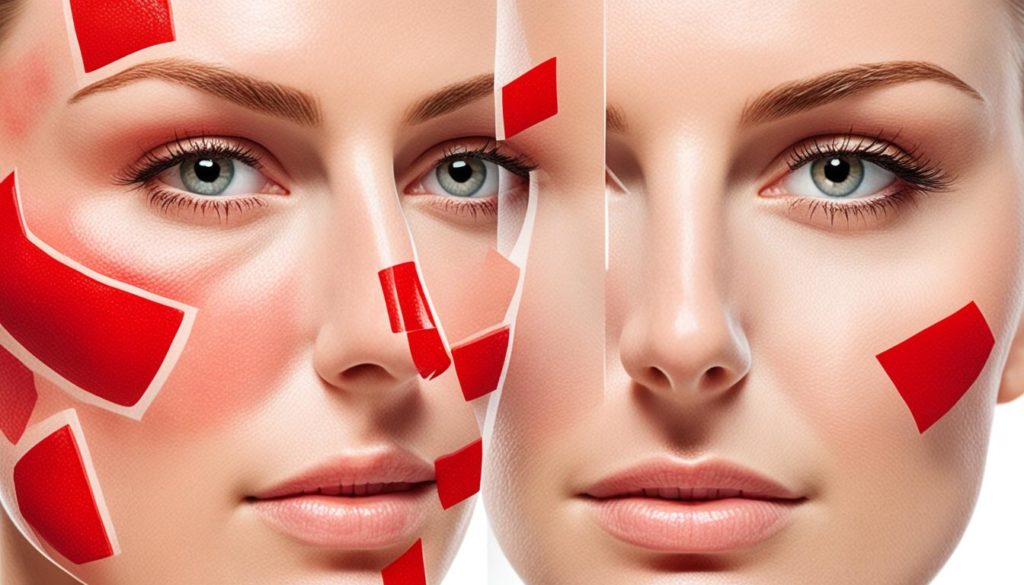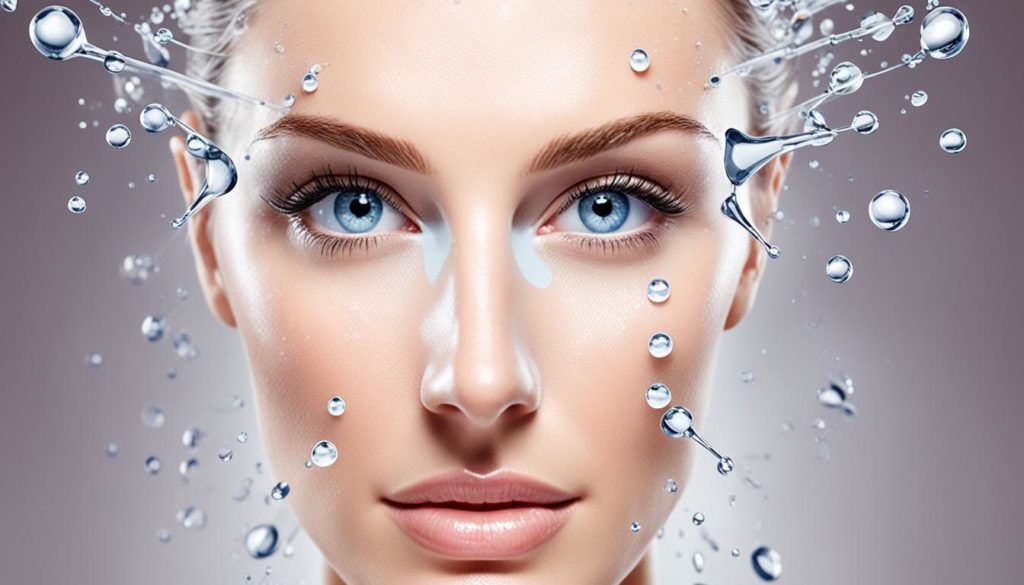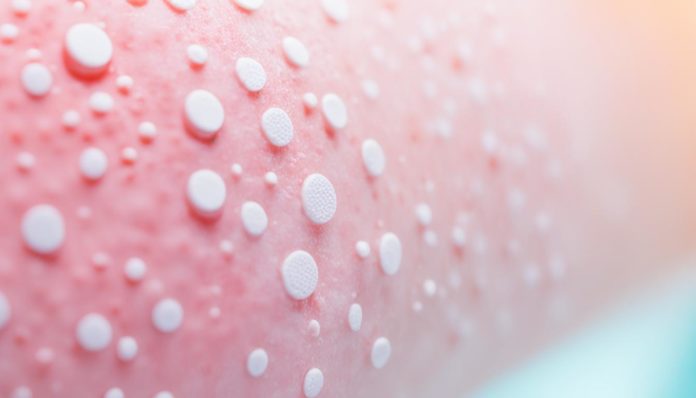Did you know that nearly 85% of people get acne at some point? Acne vulgaris is the most common type of acne. It doesn’t just change how you look. It can also affect your self-esteem and life quality. But, there’s good news. Many treatment options are available to help improve skin health.
We will look at many useful acne vulgaris treatments here. They range from creams to natural solutions. Whether you need advice on acne or want clearer skin, knowing these options can help you choose wisely for your skin care.
Key Takeaways
- Acne vulgaris affects nearly 85% of people at some stage of their lives.
- There are multiple treatment options available, both medical and natural.
- Topical treatments and oral medications are commonly used to manage acne vulgaris.
- Professional treatments and proper skincare routines play a vital role in acne management.
- Effective treatment of acne can greatly improve self-esteem and overall quality of life.
Understanding Acne Vulgaris
Acne vulgaris is a common skin problem affecting millions. Knowing what starts it can help manage acne well. Hormones, bacteria, and too much oil are main causes.

What Causes Acne Vulgaris?
Several things can cause acne. One big reason is changes in hormones like during puberty or pregnancy. These changes make the skin oily, clogging pores. Propionibacterium acnes bacteria also play a role, causing inflammation.
Common Symptoms of Acne Vulgaris
Acne vulgaris shows through various symptoms helping to spot it. Signs are blackheads, whiteheads, and painful red pimples. Blackheads and whiteheads are caused by clogged pores. Inflamed pimples are red and swollen, feeling sore.
- Blackheads: Open comedones filled with excess oil and dead skin cells.
- Whiteheads: Closed comedones that remain under the surface of the skin.
- Inflamed Pimples: Red, pain-infused bumps that can lead to deeper skin inflammation.
| Acne Type | Description |
|---|---|
| Blackheads | Open, blocked pores filled with excess oil and dead skin cells. |
| Whiteheads | Closed, blocked pores that stay beneath the skin surface. |
| Inflamed Pimples | Red, tender bumps caused by deeper skin inflammation. |
Knowing these symptoms and causes helps in tackling acne effectively.
Topical Treatments for Acne Vulgaris
Topical treatments are key in the fight against acne vulgaris. They range from over-the-counter items to prescription meds. Their goal is to address acne’s root causes and improve symptoms for clearer skin.
Over-the-Counter Solutions
Over-the-counter acne solutions are easy to find in stores and pharmacies. They feature active ingredients aimed at combating various acne problems. These solutions have key components like:
- Benzoyl Peroxide: Effective in killing acne-causing bacteria and reducing inflammation.
- Salicylic Acid: Helps in exfoliating the skin and clearing clogged pores.
Products with benzoyl peroxide and salicylic acid are favored for OTC use. They help those avoiding prescriptions.

Prescription Topicals
More severe acne often requires prescription treatments. Dermatologists prescribe these stronger options based on individual skin needs. Some top prescribed treatments include:
- Retinoids: Derived from Vitamin A, they help with cell turnover and reducing inflammation.
- Topical Antibiotics: Used with benzoyl peroxide to boost antibacterial effects and lower resistance.
| Type | Active Ingredient | Function |
|---|---|---|
| OTC Solutions | Benzoyl Peroxide, Salicylic Acid | Reduce bacteria, exfoliate skin, clear pores |
| Prescription Topicals | Retinoids | Increase cell turnover, prevent clogged pores |
| Topical Antibiotics | Reduce bacteria and inflammation |
Choosing the right topical treatment can majorly boost skin health and clarity. Whether it’s OTC products or prescription meds, regular use and following a dermatologist’s advice are key. They ensure effective acne management.
Oral Medications for Severe Acne
Dealing with tough acne can be hard, and sometimes skin creams don’t cut it. That’s when oral medications step in. We’ll look at various options for treating acne from the inside out.
Antibiotics
Antibiotics help in two ways: they reduce acne-causing bacteria and cut down inflammation. Doxycycline, minocycline, and erythromycin are common choices. They’re effective for many, especially when used with other treatments.
Oral Contraceptives
Hormonal acne in women can be tackled with oral contraceptives. These pills manage hormones that lead to acne. They are a good option for reducing acne’s impact.
Isotretinoin
Isotretinoin is a strong option for the worst acne cases. It shrinks sebaceous glands and lessens oil production. Due to its possible side effects, it’s for the toughest cases under doctor care.
Oral medications offer a solid path for those facing stubborn, severe acne. Antibiotics, birth control, and isotretinoin are key. With a doctor’s help, they can be part of a full plan to fight severe acne.
Hormonal Acne Treatment
Hormonal acne comes from changes in hormone levels, often due to an imbalance. These imbalances can make your skin oily, clogging pores and starting acne. Knowing how to handle and treat this issue is key.
Treating the hormonal imbalance can really help with hormonal acne. Using medications called androgen blockers is one way to do this. Androgens can make your skin oily and worsen acne. By blocking these hormones, you can lessen how severe your acne is.
One common androgen blocker for this is spironolactone. It stops androgens from affecting your skin. This lowers oil production and helps reduce acne. It’s especially good for women whose acne gets worse with their menstrual cycle.
| Treatment | Mechanism | Effectiveness |
|---|---|---|
| Androgen Blockers | Reduces androgen effects | High |
| Spironolactone | Blocks androgen receptors | High |
Starting a treatment plan for hormonal imbalance, like using androgen blockers and spironolactone, can really help. Always talk to a healthcare provider to find the best treatment for you.
Natural Remedies for Acne Treatment
Looking into natural remedies for acne can help your skin stay healthy. By adding holistic methods to your care routine, you can keep your skin clear. And you won’t face the harsh effects that regular treatments might cause.
Diet and Nutrition
Making changes to what you eat can make your skin clearer. Eating more fruits, vegetables, and lean proteins helps. At the same time, try to cut back on dairy and sugary foods. Foods full of nutrients give your skin the vitamins and minerals it needs to look good from the inside out.
Herbal Remedies
Herbal remedies provide a gentle way to deal with acne. For example, green tea is packed with antioxidants. These can lower oil production and keep bacteria in check. Aloe vera and chamomile also calm the skin down.
Essential Oils
Essential oils are a big part of natural acne solutions. Tea tree oil, in particular, is great for fighting bacteria and reducing swelling. Just a little bit of diluted tea tree oil on spots can help without making your skin dry. Make sure to dilute it correctly to prevent any skin irritation.
Bringing these natural skincare methods into your daily life can control acne well. Eating right, using herbs, and trying essential oils like tea tree oil can lead to clearer, better skin.
| Remedy | Benefit |
|---|---|
| Dietary Changes | Reduces acne outbreaks |
| Green Tea Extract | Antibacterial and reduces sebum |
| Tea Tree Oil | Anti-inflammatory and antibacterial |
Skincare for Acne Prevention
Preventing acne starts with a balanced skincare routine. It’s about knowing your skin’s needs and avoiding harmful treatments. By using an acne skincare regimen that fits your skin type, you’ll see clearer skin gradually.
Daily Skincare Routine
Start a daily routine if you have acne-prone skin. Use a gentle cleanser morning and night to wash away oil and dirt. Then, use a toner with salicylic acid to shrink pores and reduce swelling. Finish with a light moisturizer that hydrates but doesn’t clog pores.
Choosing the Right Products
Choosing the correct products is key to managing acne. Go for non-comedogenic products that don’t close off pores. Look for items with benzoyl peroxide, adapalene, or alpha hydroxy acids. These target acne well. Reading labels helps you pick products that improve your skincare.
Avoiding Common Mistakes
Avoid common skincare mistakes to avoid that make acne worse. Too much washing, harsh scrubs, or skipping moisturizer damages your skin’s barrier. Also, don’t pick or squeeze pimples to avoid scars and more swelling. Being gentle and consistent with your skincare can bring big changes.
For detailed tips on nonprescription acne solutions, check the Mayo Clinic’s guide on acne treatments.
Professional Treatments and Procedures
Many people turn to professional help for severe acne, hoping for clearer skin. Treatments like chemical peels, microdermabrasion, and laser therapy are top choices. They have proven to be effective in the battle against acne.
Chemical Peels
Chemical peels are well-known in the fight against acne. They involve a chemical solution that exfoliates the skin. This process reveals smoother, renewed skin underneath by peeling away dead cells. It’s great for unclogging pores and reducing breakouts.
Microdermabrasion
Microdermabrasion stands out for those wanting smoother skin. It’s a gentle procedure that removes the top layer of dead skin. It boosts collagen production, making the skin look fresh. Also, it lessens acne scars and improves skin texture.
Laser Therapy
Laser therapy is a favorite for its direct and powerful approach. It uses light to fight acne bacteria and calm inflammation. This helps lessen current acne and stop new ones from forming. Laser therapy also fixes pigmentation and aids in skin renewal.
| Treatment | Benefits |
|---|---|
| Chemical Peels | Exfoliates skin, unclogs pores, reduces breakouts |
| Microdermabrasion | Removes dead skin cells, stimulates collagen, diminishes scars |
| Laser Therapy | Kills acne bacteria, reduces inflammation, improves texture |
Treating Acne Scars
Dealing with acne scars can be tough. It’s important to know the different types and treatment options. There are many treatments out there, from simple to advanced.
Types of Acne Scars
Different acne scars need different treatments. The main types include:
- Atrophic Scars: These are common and vary as ice pick, boxcar, and rolling scars.
- Hypertrophic Scars: These are raised scars caused by too much collagen.
- Keloid Scars: Like hypertrophic but spread more and are harder to treat.
Effective Scar Treatments
Treating acne scars involves various strategies. Depending on the scar type and severity, here are some treatments:
- Topical Treatments: Products like retinoids and silicone gels help smooth and reduce scars.
- Chemical Peels: These peel off the top skin layer, helping reduce scars over time.
- Microneedling: It boosts collagen production and improves skin texture.
- Laser Therapy: Great for scars and enhancing skin texture and tone.
- Dermal Fillers: These injections raise depressed scars, improving skin shape.
Choosing the right treatment depends on the individual. Talk to a dermatologist to get the best results. Understanding the different scar types and treatment options can lead to a big improvement in skin look.
Best Over-the-Counter Acne Products
Finding the best acne products is key to treating and preventing breakouts. We’ll look at top cleansers, spot treatments, and moisturizers for acne-prone skin.
Top Cleansers
It’s vital to start with a great acne cleanser. These products rid your skin of oil and dirt that cause acne. Neutrogena and Cetaphil are both effective and gentle, making them top picks.
Effective Spot Treatments
For direct hits on pimples, spot treatments are super helpful. We love ones with benzoyl peroxide or salicylic acid. Brands like Clean & Clear and Mario Badescu are favorites. They fight pimples fast but keep your skin from drying out.
Moisturizers for Acne-Prone Skin
Finding the right moisturizer is tough for those with oily skin. The best kinds are light and won’t clog pores. Try La Roche-Posay Effaclar Mat or Neutrogena Hydro Boost Water Gel. They keep your skin hydrated but not oily, promoting a clear look.
Managing Cystic Acne
Managing cystic acne is tough because it’s a serious kind of acne. You need different ways to tackle it, involving doctors’ treatments and changes in how you live. If you have this deep skin acne, here are some expert tips and treatments to try:
- Medical Interventions: Doctors usually suggest medicines. These include pills to kill bacteria and lower swelling, and also hormones like birth control pills.
- Topical Treatments: Strong creams called topical retinoids are also used. They keep pores clear and help stop more breakouts.
- Professional Procedures: Getting shots of corticosteroid directly into the acne can calm swelling and make healing faster.
Making changes in your daily life also helps in dealing with cystic acne. It’s good to have a skin care routine that’s gentle. Use products that don’t clog pores and stay away from touching or picking at your skin. This can stop more problems and scars.
Check out this table to see some top treatments recommended by skin doctors for serious acne:
| Treatment Type | Method | Benefits |
|---|---|---|
| Oral Antibiotics | Medication | Reduces bacteria and inflammation |
| Topical Retinoids | Cream/Gel | Unclogs pores, prevents new outbreaks |
| Corticosteroid Injections | Injection | Reduces swelling, speeds healing |
By using medical treatments and good skin care together, you can control cystic acne well. Always talking to a skin doctor for advice that fits you is smartest.
Conclusion
Acne vulgaris is complex and needs careful analysis for effective treatment. We should look at causes like hormones, bacteria, and genes. This helps us find long-lasting solutions. Both creams and pills are vital in fighting acne. Working with doctors for a custom plan is key to the best care and outcomes.
Natural remedies can also play a part alongside usual treatments. Things like adjusting your diet, trying herbs, and using essential oils can help. It’s important to stick to a good skincare routine and steer clear of common errors. Treatments like chemical peels, microdermabrasion, and laser therapies improve skin’s look and feel.
To fix acne scars, it’s important to know the different types and how to treat them. Managing cystic acne and picking top over-the-counter products are essential steps toward clear skin. A complete strategy, with expert advice, promises lasting and effective control.
Using a team of healthcare experts is crucial, as the NCBI guide on acne vulgaris suggests. Through steady, personal care plans, beating acne vulgaris is a realistic goal for those affected.
FAQ
What are the primary causes of acne vulgaris?
Acne vulgaris mainly comes from pores getting clogged and bacteria growing. Hormones and too much oil play a part too. Things like diet, stress, and some meds can make it worse.
What are the common symptoms of acne vulgaris?
Symptoms of acne vulgaris include spots like blackheads, whiteheads, and big pimples. These can pop up on your face, neck, back, and shoulders.
What over-the-counter solutions are available for treating acne?
You can find over-the-counter options like creams with benzoyl peroxide or salicylic acid. They help soothe inflammation and clean out pores. They also kill bacteria on your skin.
When is it necessary to use prescription topicals for acne treatment?
If stuff from the store doesn’t clear up your acne, doctors might prescribe special creams. These often contain retinoids or antibiotics to unclog pores and calm inflammation.
How do oral antibiotics help in treating severe acne?
Oral antibiotics lower bacteria levels and soothe swelling in bad acne cases. Doxycycline and minocycline are common choices that doctors may prescribe.
Can oral contraceptives be used to treat hormonal acne?
Yes, birth control pills can help with acne by balancing hormones. They’re especially good for women who get breakouts with their periods.
What is isotretinoin and how does it help with severe acne?
Isotretinoin is a strong pill for serious cystic acne. It hugely lowers oil production. Due to risks, your doctor needs to watch your treatment closely.
How do hormonal fluctuations contribute to acne development?
Changes in hormones can make your skin oilier and clog pores. This leads to acne. Especially, certain hormones called androgens are to blame.
What natural remedies can help in treating acne?
Eating well, using green tea extracts, and tea tree oil are natural ways to fight acne. These can support your skin’s health and cut down on pimples.
What should a daily skincare routine for acne prevention include?
For keeping acne away, clean gently with a special acne soap. Use products with salicylic acid or benzoyl peroxide. Don’t forget moisturizer and sunscreen.
What are some common mistakes to avoid in acne skincare?
Don’t wash too much or use rough scrubs, and never pop pimples. These make your skin angry and can make acne worse. Pick products made for acne skin.
What professional treatments are available for acne?
Things like chemical peels, scrubbing treatments, and lasers can help a lot. They clean off dead skin, kill germs, and make your skin smoother.
What are the different types of acne scars?
Acne scars can be atrophic, like small deep pits, or raised. Knowing your scar type helps choose the best treatment.
What are some effective treatments for acne scars?
For scars, there are creams with retinoids and hyaluronic acid. Treatments like microneedling and laser help too. They make scars less visible and smooth the skin.
What are some top-rated over-the-counter acne products?
The best products have salicylic acid or benzoyl peroxide. Hydrocolloid patches for spots and oil-free moisturizers are also good choices.
How can cystic acne be effectively managed?
Managing cystic acne usually needs a mix of treatments. Options include creams, pills, hormone therapy, and changes in your life. A skin doctor can offer personalized advice.


